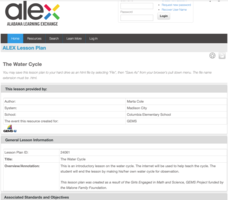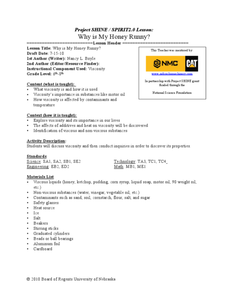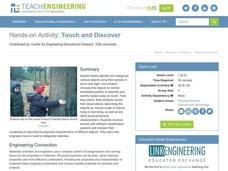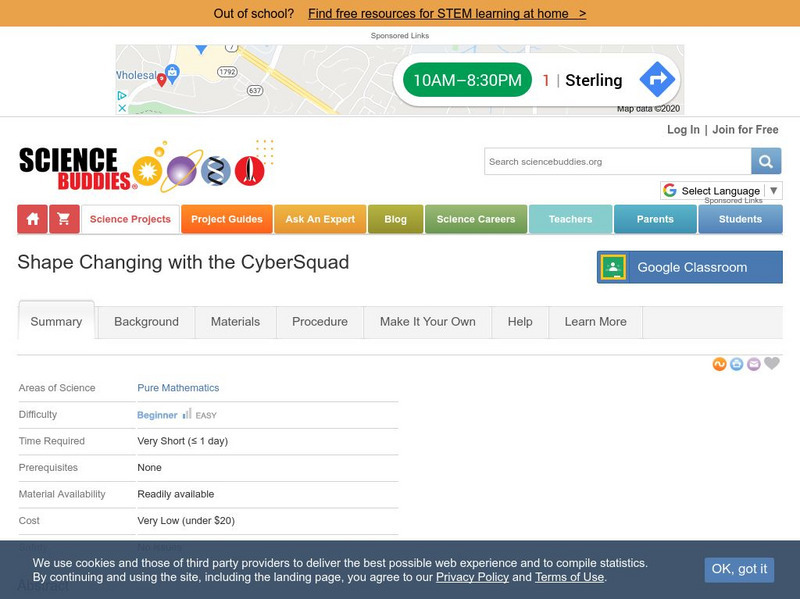Curated OER
What Trickles Down?
Students explore different levels of permeability and compare the permeabilities of several different materials. They are introduced to the basic concepts of building design, landscape architecture, and environmental pollutant transport....
Curated OER
Beyond the Earth Part II
Learners explore the solar system. In this solar system lesson, students use Internet and print resources to research a component of the solar system. Learners create travel brochures based on their research findings.
Curated OER
Beyond The Earth Part I
Students explore the solar system. In this space science lesson, students take notes on the solar system provided by their instructors. Students then collaborate to design a computer-generated drawing of the solar system.
Alabama Learning Exchange
This Is How We Roll!
Students research how roller coasters work. In this physics lesson, learners research the history of roller coasters and the safety factors in the design of a roller coaster on the website www.learner.org/exhibits/parkphysics. They...
Alabama Learning Exchange
The Water Cycle
Young scholars explore the water cycle. In this earth science lesson plan, they read the book Water Dance by Thomas Locker and use an interactive whiteboard to review the water cycle with an interactive website.
Alabama Learning Exchange
Musical Patterns
Young scholars explore the concept of patterning using musical instruments. In this music lesson, students identify several instruments and practice playing patterns with them. Young scholars identify the patterning in a musical piece.
Alabama Learning Exchange
Bird Migration
Students study the concept of bird migration. In this bird lesson, students read Make Way for Ducklings, discuss the concept of community, and write reflections.
Curated OER
Why is My Honey Runny?
Students identify the factors that affect viscosity of substances. In this chemistry lesson, students define what viscosity is in their own words. They give real world applications of viscosity.
Curated OER
Touch and Discover
Pupils work together to identify and categorize objects. They have to identify the object on touch because they are blindfolded. They record their data and describe the objects once they can look at them.
Alabama Learning Exchange
Writing Word Equations
Students explore the concept of chemical formulas. For this chemical formula lesson, students watch a video about balancing chemical equations. Students conduct an experiment using silver nitrate and sodium phosphate. ...
Curated OER
Honey ! I Blew Up The Bee!
Second graders complete a variety of bee-themed activities. They consider the importance of honeybees in food production, conduct Internet research, prepare foods using honey, complete puzzles and compile a portfolio of their work.
Curated OER
Rockets on a Shoestring Budgut
Young scholars work together to create rockets on a budget. They discover the limitations that real engineers face when designing and testing their products. They discuss their findings to complete the lesson.
Curated OER
Writing Directions for Mathematical Activities
Fifth graders reorganize comic strips to have them make sense, complete outline and organize their thoughts into outline form to explain directions,
and use that outline to complete their own directions for geometry activities.
Curated OER
Life in a Cup
Third graders make and maintain a mini terrarium. They keep a daily journal of what happens in their terrarium and record daily observations and measurements.
Alabama Learning Exchange
Alex: Miss Integer Finds Her Properties in Order.
A lesson on: Order of Operations, Integers, Numerical Sentences, and Absolute Value.This lesson plan was created as a result of the Girls Engaged in Math and Science, GEMS Project funded by the Malone Family Foundation.
Science Buddies
Science Buddies: Shape Changing With the Cyber Squad
In this project, you will make 2-dimensional templates, called nets, that fold up into 3-dimensional (3-D) shapes. By making shapes of different sizes, you will be able to see how 3-D shapes change with size. In your findings you will...
Alabama Learning Exchange
Alex: Minerals
The young scholars will gain information on the five characteristics of minerals. The information can be related to nonrenewable resources. This lesson should facilitate discussion on the difference between precious gems and...
Alabama Learning Exchange
Alex: What's the Matter: A Sinker or Floater?
Students will explore matter that sinks or floats when submerged in water and that matter is categorized as either a sinker or a floater. Students will work actively in small, cooperative learning groups as well as gather in a whole...
Alabama Learning Exchange
Alex: How Light Travels
In this instructional activity, the learners will be experimenting to show how light shines in a straight line. They will also be experimenting to see how light reflects using mirrors. The students will be working in cooperative learning...
Writing Fix
Writing Fix: Personified Number Stories
In this lesson, A Tree Grows in Brooklyn by Betty Smith is used as the mentor text. Students will explore numbers and the properties of these numbers. Students will then write a math story, using the explored numbers, and incorporate...
Writing Fix
Writing Fix: Shape "Monsters" at Night
Using Melanie Watt's book entitled Scaredy Squirrel at Night, this multi-day instructional activity allows students to apply information about Scaredy Squirrel's night time experiences and its fears as their final product model. Students...
Alabama Learning Exchange
Alex: To Push or Pull, That Is the Question?
In group students will learn to identify pushes and pulls. Students will learn how a push or pull will affect various items. This lesson plan was created as a result of the Girls Engaged in Math and Science University, GEMS-U Project.
Alabama Learning Exchange
Alex: What's the Matter: Concentration Game
What's the Matter? is a guided inquiry lesson on classification of matter, physical and chemical properties, and physical and chemical changes. There are two parts to this lesson: (a) concentration game for definitions and (b)...
Alabama Learning Exchange
Alex: Mix It Up!
By now, young scholars have learned that fact families include both addition and subtraction facts. They have also learned that by reversing the order of the addends, they can form related addition facts with the same sum. The students...























